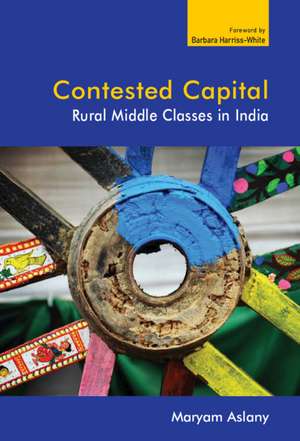Contested Capital: Rural Middle Classes in India
Autor Maryam Aslanyen Limba Engleză Hardback – 2 dec 2020
Preț: 698.50 lei
Preț vechi: 784.83 lei
-11% Nou
Puncte Express: 1048
Preț estimativ în valută:
133.66€ • 139.28$ • 110.67£
133.66€ • 139.28$ • 110.67£
Carte tipărită la comandă
Livrare economică 03-17 aprilie
Preluare comenzi: 021 569.72.76
Specificații
ISBN-13: 9781108836333
ISBN-10: 110883633X
Pagini: 322
Dimensiuni: 165 x 236 x 25 mm
Greutate: 0.64 kg
Editura: Cambridge University Press
Colecția Cambridge University Press
Locul publicării:Cambridge, United Kingdom
ISBN-10: 110883633X
Pagini: 322
Dimensiuni: 165 x 236 x 25 mm
Greutate: 0.64 kg
Editura: Cambridge University Press
Colecția Cambridge University Press
Locul publicării:Cambridge, United Kingdom
Cuprins
List of figures and maps; List of tables; List of abbreviations; Foreword Barbara Harriss-White; Acknowledgments; Introduction. The problem of the 'rural middle class(es)'; 1. Trajectory of the Indian middle class: its size and geographical variations; 2. In search of the rural middle classes: from village stratification to rural household variations; 3. Marx: capital, labour and the rural middle classes; 4. Weber: marketable capital, status and the rural middle classes; 5. Bourdieu: cultural capital, self-perception and the middle-class identity in rural India; Conclusion. Understanding the rural middle classes; Appendices; References; Index.
Recenzii
'Aslany analyses the making of an Indian rural middle class, at the intersection of caste, class and status by combining quantitative and ethnographic methods. Her book is a rather unique contribution to the study of 'rurbanisation' in India. Comparing two villages of Pune district, it shows how their inhabitants depend less and less on agriculture, but commute to nearby factories. A great work on an understudied key subject!' Christophe Jaffrelot
'This is an excellent and empirically rich treatise on the self-perception people have of where they belong in India's changing class spectrum.' Jan Breman, University of Amsterdam
'This book significantly enriches our understanding of the changing dynamics of rural lives in India of the 21st century. By focussing on the subject of the 'rural middle class', the book opens up the study of the Indian village to an altogether new set of questions. Such a framing of the process of social change also enables the author to move out of the essentialist notions of the 'rural' and of 'India' that have often plagued the social science scholarship on the region. The use of 'critical pluralism' as a mode of approaching and analysing the subject has much to offer as an alternative way of looking at the middle classes and the complicated ways in which their formation intersects with other aspects of change, structural and discursive.' Surinder Jodhka, Jawaharlal Nehru University, New Delhi
'This is an excellent and empirically rich treatise on the self-perception people have of where they belong in India's changing class spectrum.' Jan Breman, University of Amsterdam
'This book significantly enriches our understanding of the changing dynamics of rural lives in India of the 21st century. By focussing on the subject of the 'rural middle class', the book opens up the study of the Indian village to an altogether new set of questions. Such a framing of the process of social change also enables the author to move out of the essentialist notions of the 'rural' and of 'India' that have often plagued the social science scholarship on the region. The use of 'critical pluralism' as a mode of approaching and analysing the subject has much to offer as an alternative way of looking at the middle classes and the complicated ways in which their formation intersects with other aspects of change, structural and discursive.' Surinder Jodhka, Jawaharlal Nehru University, New Delhi
Notă biografică
Descriere
It explores the formation of India's rural middle class, which rests on a complex, and often contradictory, set of processes that began unfolding with growing industrialisation in rural areas.
